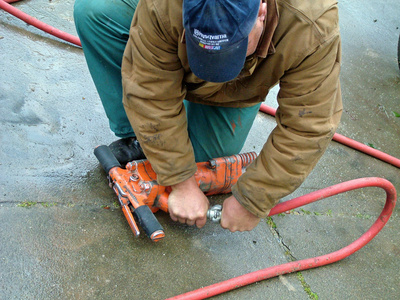
Air compressors are vital for impact wrenches and other air-powered tools. When temperatures dip below freezing, even small amounts of water vapor in the tank can freeze in the lines. The clogging that results will cause the air transmission line to fail and put excessive stress on the compressor's motor. Even when the ambient temperature dips below 40 degrees Fahrenheit, compressors can become hard to start. Ideally, you should store your air compressor in a heated garage. When that isn't possible, there are things you can do to keep it operating smoothly.
Change the oil in the compressor to a lighter weight winter grade when temperatures begin to drop into the 40s. The manufacturer usually recommends a specific oil for normal use, which is intended to be in a warm room. In wintertime, try a 15 weight oil. If your garage gets well below freezing, you can safely go to as low as a 5 weight oil. Follow the manufacturer's instructions for changing the oil. This will make it easier to start and keep it running more efficiently in cool weather.
Dump all excess water from the tank after each use. Water buildup can damage an air compressor. In commercial settings, water is dumped from the tanks daily. At the bottom of every compressor tank is a drain valve. Open the drain valve at the completion of each use, especially in cool weather.
Place a space heater near the compressor and transmission lines for several hours prior to using it in freezing temperatures. You want to get the air temperature around the compressor to a normal inside room temperature and keep it that way for a few hours. Do not move the space heater too close in an effort to speed up the process. Both the oil and the transmission line should be warmed gently. This will make it easier to start the compressor and will liquefy any vaporized water that's frozen into the lines.